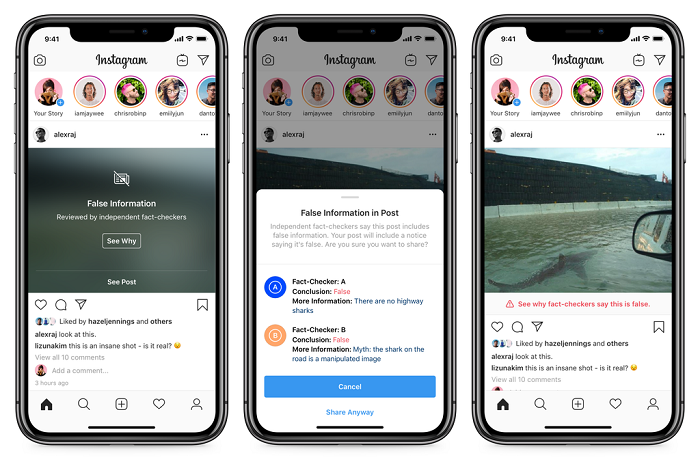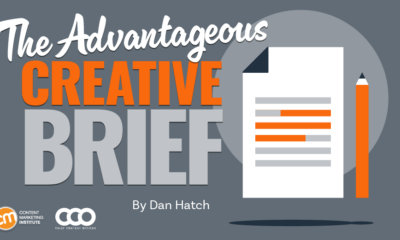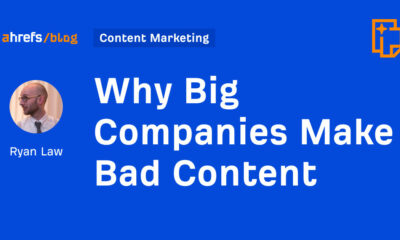SOCIAL
Facebook Adds Additional Fact-Checking Resources via ‘Community Reviewers’

Facebook continues its confusing approach to fact checking with a new program that will see the appointment of a team of ‘community reviewers’, a diverse group of non-Facebook employees who will be called upon to check potentially false reports.
As explained by Facebook:
“The program will have community reviewers work as researchers to find information that can contradict the most obvious online hoaxes or corroborate other claims. These community reviewers are not Facebook employees but instead will be hired as contractors through one of our partners. They are not making final decisions themselves. Instead, their findings will be shared with the third-party fact-checkers as additional context as they do their own official review.”
The process will work like this:
First, Facebook’s machine learning process will identify potentially false claims and misinformation in posts, as it does already. When content is tagged as potentially false, Facebook’s system will then send the post in question on to the new team of community reviewers. The community reviewers will be prompted to check the post, and if they, through their own, additional research, find that the post is, in fact, incorrect, they’ll be able to attach their findings, which Facebook’s fact-checkers will then be able to refer to in their official assesment.
The process essentially adds a broader spectrum of input into the fact-checking process, which could improve the accuracy of the outcomes, and lessen accusations of bias.
Facebook has partnered with data company YouGov to select its new community review panel, after YouGov conducted research into how to best build such an input group.
As per Facebook:
“YouGov conducted an independent study of community reviewers and Facebook users. They determined that the requirements used to select community reviewers led to a pool that’s representative of the Facebook community in the US and reflects the diverse viewpoints – including political ideology – of Facebook users. They also found the judgments of corroborating claims by community reviewers were consistent with what most people using Facebook would conclude.”
Note the specific mention of political ideology. By enabling more people to provide input into its fact-checking process, Facebook’s working to improve both the relative accuracy of its findings, and to lessen accusations that its favoring one side of politics over another. Which has become a key sticking point in its various fact-checking and political transparency processes – which brings us to the confusing part of Facebook’s broader fact-checking improvements: its stance against fact-checking political ads.
Honestly, with every improvement, with every expansion of its overall fact-checking program, Facebook’s decision not to fact-check political ads seems less and less logical, or viable as a long-term measure.
The company continues to invest significant resources into its fact-checking program, underlining its importance – just this week, Facebook expanded its fact-checking program on Instagram.

So its clearly important, Facebook clearly acknowledges that it needs to do what it can to limit the spread of misleading information and false claims on its platform, especially when it comes to concerning movements like anti-vaxxers and the like.
Misinformation is a problem – so why allow politicians, a group which has huge influence over public opinion, share false claims within their ad content?
Facebook has previously noted that it doesn’t want to be the referee on political speech, and that the public has a right to know what’s being said by political leaders.
As per Mark Zuckerberg, in his speech announcing Facebook’s political ads stance:
“Political advertising is more transparent on Facebook than anywhere else — we keep all political and issue ads in an archive so everyone can scrutinize them, and no TV or print does that. We don’t fact-check political ads. We don’t do this to help politicians, but because we think people should be able to see for themselves what politicians are saying. And if content is newsworthy, we also won’t take it down even if it would otherwise conflict with many of our standards.”
But the problem, as noted, is that political leaders carry significant sway. For example, if a recognized political figure were to come out and say that, yes, vaccines are dangerous, that would add serious weight to that movement, and embolden them to push harder in their campaigning. And under Facebook’s current rules, a political leader could do just that, via Facebook ads.
Does that seem like the right approach? And given Facebook’s broader efforts to stop the spread of misinformation, including this new update, does that not seem out of step with its overall effort?
Confusing. Unclear. But, for what it’s worth, Facebook is adding in a new way to improve the accuracy of its general fact-checking by running content by a more diverse collection of reviewers. So that’s something, I guess.
SOCIAL
Snapchat Explores New Messaging Retention Feature: A Game-Changer or Risky Move?

In a recent announcement, Snapchat revealed a groundbreaking update that challenges its traditional design ethos. The platform is experimenting with an option that allows users to defy the 24-hour auto-delete rule, a feature synonymous with Snapchat’s ephemeral messaging model.
The proposed change aims to introduce a “Never delete” option in messaging retention settings, aligning Snapchat more closely with conventional messaging apps. While this move may blur Snapchat’s distinctive selling point, Snap appears convinced of its necessity.
According to Snap, the decision stems from user feedback and a commitment to innovation based on user needs. The company aims to provide greater flexibility and control over conversations, catering to the preferences of its community.
Currently undergoing trials in select markets, the new feature empowers users to adjust retention settings on a conversation-by-conversation basis. Flexibility remains paramount, with participants able to modify settings within chats and receive in-chat notifications to ensure transparency.
Snapchat underscores that the default auto-delete feature will persist, reinforcing its design philosophy centered on ephemerality. However, with the app gaining traction as a primary messaging platform, the option offers users a means to preserve longer chat histories.
The update marks a pivotal moment for Snapchat, renowned for its disappearing message premise, especially popular among younger demographics. Retaining this focus has been pivotal to Snapchat’s identity, but the shift suggests a broader strategy aimed at diversifying its user base.
This strategy may appeal particularly to older demographics, potentially extending Snapchat’s relevance as users age. By emulating features of conventional messaging platforms, Snapchat seeks to enhance its appeal and broaden its reach.
Yet, the introduction of message retention poses questions about Snapchat’s uniqueness. While addressing user demands, the risk of diluting Snapchat’s distinctiveness looms large.
As Snapchat ventures into uncharted territory, the outcome of this experiment remains uncertain. Will message retention propel Snapchat to new heights, or will it compromise the platform’s uniqueness?
Only time will tell.
SOCIAL
Catering to specific audience boosts your business, says accountant turned coach

While it is tempting to try to appeal to a broad audience, the founder of alcohol-free coaching service Just the Tonic, Sandra Parker, believes the best thing you can do for your business is focus on your niche. Here’s how she did just that.
When running a business, reaching out to as many clients as possible can be tempting. But it also risks making your marketing “too generic,” warns Sandra Parker, the founder of Just The Tonic Coaching.
“From the very start of my business, I knew exactly who I could help and who I couldn’t,” Parker told My Biggest Lessons.
Parker struggled with alcohol dependence as a young professional. Today, her business targets high-achieving individuals who face challenges similar to those she had early in her career.
“I understand their frustrations, I understand their fears, and I understand their coping mechanisms and the stories they’re telling themselves,” Parker said. “Because of that, I’m able to market very effectively, to speak in a language that they understand, and am able to reach them.”Â
“I believe that it’s really important that you know exactly who your customer or your client is, and you target them, and you resist the temptation to make your marketing too generic to try and reach everyone,” she explained.
“If you speak specifically to your target clients, you will reach them, and I believe that’s the way that you’re going to be more successful.
Watch the video for more of Sandra Parker’s biggest lessons.
SOCIAL
Instagram Tests Live-Stream Games to Enhance Engagement

Instagram’s testing out some new options to help spice up your live-streams in the app, with some live broadcasters now able to select a game that they can play with viewers in-stream.
As you can see in these example screens, posted by Ahmed Ghanem, some creators now have the option to play either “This or That”, a question and answer prompt that you can share with your viewers, or “Trivia”, to generate more engagement within your IG live-streams.
That could be a simple way to spark more conversation and interaction, which could then lead into further engagement opportunities from your live audience.
Meta’s been exploring more ways to make live-streaming a bigger consideration for IG creators, with a view to live-streams potentially catching on with more users.
That includes the gradual expansion of its “Stars” live-stream donation program, giving more creators in more regions a means to accept donations from live-stream viewers, while back in December, Instagram also added some new options to make it easier to go live using third-party tools via desktop PCs.
Live streaming has been a major shift in China, where shopping live-streams, in particular, have led to massive opportunities for streaming platforms. They haven’t caught on in the same way in Western regions, but as TikTok and YouTube look to push live-stream adoption, there is still a chance that they will become a much bigger element in future.
Which is why IG is also trying to stay in touch, and add more ways for its creators to engage via streams. Live-stream games is another element within this, which could make this a better community-building, and potentially sales-driving option.
We’ve asked Instagram for more information on this test, and we’ll update this post if/when we hear back.
-
SEARCHENGINES7 days ago
Daily Search Forum Recap: April 30, 2024
-

 MARKETING6 days ago
MARKETING6 days agoHow To Develop a Great Creative Brief and Get On-Target Content
-

 WORDPRESS7 days ago
WORDPRESS7 days ago13 Best Fun WordPress Plugins You’re Missing Out On
-

 SEO6 days ago
SEO6 days agoWhy Big Companies Make Bad Content
-

 SEO7 days ago
SEO7 days agoOpenAI To Show Content & Links In Response To Queries
-

 SEO6 days ago
SEO6 days agoHow To Drive Pipeline With A Silo-Free Strategy
-
SEARCHENGINES3 days ago
Daily Search Forum Recap: May 3, 2024
-

 PPC6 days ago
PPC6 days ago26 Ready-to-Go AI Prompts for Social Media



